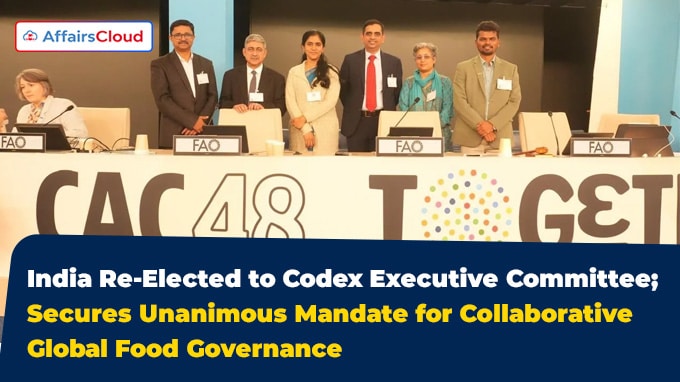India has been unanimously re-elected to the Executive Committee of the Codex Alimentarius Commission (CCEXEC) for the Asia Region during the 48th Session of the Codex Alimentarius Commission (CAC48), held from 10–14 November 2025 at the Food and Agriculture Organization(FAO) Headquarters in Rome, Italy. With this re-election, India’s term of representation for the Asia Region has been extended until the conclusion of CAC50 in 2027.
- Rajit Punhani, Chief Executive Officer (CEO) of the Food Safety and Standards Authority of India (FSSAI) led the Indian delegation which also included officials from the Ministry of Health and Family Welfare (MoHFW) and several technical experts.
Exam Hints:
- What? Re-election of India to CCEXEC for Asia Region
- Term: Until CAC50 (2027)
- Re-elected at: CAC48
- Indian Delegation Led by: Rajit Punhani, CEO of FSSAI
- Key Standards/Guidelines Adopted:
- Standard for fresh dates at (Step 8)
- New Guidelines on Pesticide Residue
- Revised Code for Reducing Contamination of Alfatoxin in Peanuts
- Inclusion of Nitrogen-to-Protein conversion factors
- Revived Cashew Kernel Standard
India Led Key Outcomes:
Stressed on Updating Data: India as Member Asia played a pivotal role during the CCEXEC89 session. India stressed on the focus on updating and developing databases on food additives, pesticide residues, veterinary drugs, methods of analysis, and contaminants in food.
Technology Adoption: Promoted use of Artificial Intelligence (AI) to improve efficiency in document translation and data handling across Codex processes.
New Standards for Fruits & Vegetables: India chaired the working groups at the Codex Committee on Fresh Fruits and Vegetables (CCFFV), saw the adoption of the Standard for fresh dates at Step 8, a significant step for harmonizing global trade practices.
- India also forwarded the Standard for Fresh Curry Leaves for Adoption.
Guidelines for Pesticides Residues: At the Codex Committee on Pesticide Residues (CCPR), India contributed significantly to the adoption of guidelines on monitoring the stability and purity of pesticide reference materials during long-term storage.
- This move is expected to bolster laboratory capacity in the region and support data submissions for setting Maximum Residue Limits (MRLs).
Code for Reducing Aflatoxin Contamination: India also extended its support for the revised Code of Practice for reducing aflatoxin contamination in peanuts.
- This code aligns food additive provisions under the General Standard for Food Additives (GSFA).
Inclusion of Nitrogen-to-Protein Conversion Factors: Members of the Codex Committee on Methods of Analysis and Sampling (CCMAS) adopted the inclusion of ‘nitrogen-to-protein conversion factors’ as an annex to the recommended methods of analysis and sampling.
- This move will provide laboratories with standardised tools to assess food quality across sectors.
Standard for Cashew Kernels: India pushed for the advancement of Standard for Cashew Kernel, prompting CAC48 to recommend a Circular Letter seeking comments and preparing the proposal for review at CCEXEC90 and CAC49.
About Codex Alimentarius Commission (CAC):
It is an international body established jointly by FAO and World Health Organisation (WHO). The body is mainly responsible for all matters related to implementation of the joint FAO/WHO food standards programme.
Chairperson- Allan Azegele (Kenya)
Members- 189 (including 188 member countries and The European Union (EU))
Established in- 1963





